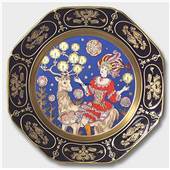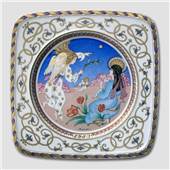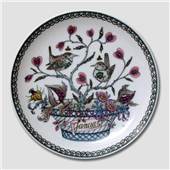History of Hutschenreuther
 German factory founded in Hohenburg by Carolus Magnus Hutschenreuther (CMH). One of the first privately owned porcelain factories in Germany. The name of the factory was "Betrieb Porzellanfabrik C.M.Hutschenreuther AG".
German factory founded in Hohenburg by Carolus Magnus Hutschenreuther (CMH). One of the first privately owned porcelain factories in Germany. The name of the factory was "Betrieb Porzellanfabrik C.M.Hutschenreuther AG".



Carolus Magnus Hutschenreuther was a porcelain painter, earlier employed at the Wallendorf Factory. The factory produced porcelain industrially from the start. Upon the death of CMH, the factory was carried on by his widow and children. A big fire in 1848 destroyed the factory among many others, but the factory was rebuilt.
Lorenz Hutschenreuther (LH), one of Carolus six children, opened his own factory in Selb in 1857. After the great fire of Selb in 1856, destroying most of the town, Lorenz built his factory with one oven and room for 50 workers. His factory was named "Herstellerwerk Lorenz Hutschenreuther". LH presented his products at the Leipziger Fair, and the orders poured in. Lorenz could not even begin to deliver in those quantities, only possessing one oven. Having learned from this, Lorenz built more ovens and expanded the factory with painting workshops, in order to produce larger quantities of painted porcelain.
Almost instantly the factory won fame for its fine porcelain and beautiful dinner sets. Lorenz Hutschenreuther retired in 1877 due to health problems. His sons Viktor (VH) and Eugen (EH) Hutschenreuther took over. In 1880 Hutschenreuther entered into important relationsships and co-operation with contemporary artists, and the factory thus had a headstart in the development of new products and styles. Stepping into the new century, the factory expanded considerably.
By 1902 the factory was registered as a company and in 1906 the company took over the recently built "Porzellanfabrik Jäger, Werner & Co.", also situated in Selb. Another Selb-factory "Porzellanfabrik Paul Müller" was bought in 1917, at the same time as the Hutschenreuther Art-department was established. The Art-department was managed by Professor Fritz Klee, founder, former director and teacher of The Royal Bavarian Technical College of Porcelain in Selb.
When in 1926 Selb celebrated its 500 years anniversary, a huge exhibition showing Selb-produced porcelain was arranged by professor Fritz Klee. The anniversary speaker was Lorenz Hutschenreuther, the founder of "Selb the Porcelain-City". The city Selb existed before Lorenz' factory, but following the big fire in 1856, almost everything was gone, so in a matter of speaking, Lorenz' factory was the beginning of the city, and from the start just about the only place in town, where people could get a job. Before the fire, Selb was a city of weaving mills and weaving workshops, but not a single weaving workshop survived the fire.
The porcelain factories "Tirschenreuth" and "Gebrüder Bauscher" in Weiden were acquired in 1927. Former director of the National Porcelain-manufacturers in Meissen, Max Adolf Pfeifer, was engaged as artistic and technical counsellor at the Selb factory in 1934, and by 1937 the company won the gold medal at The World Exhibitions in Paris.
National Porcelain-manufacturers Berlin by the Paul Müller Plant was evacuated in 1943.
Allmost all production of artwares etc. was stopped during the war, and many factories were bombed. At the end of the war production was resumed in small selections, and big orders were delivered to the American headquarters in the US-zone.
Lorenz Hutschenreuther AG celebrated their centenary in 1957, and ten years later the Art-department celebrated its 50thanniversary. Based on a dispute of inheritance following the fathers death in 1845, when Lorenz, although capable and willing, did not inherit the company, the two family factories had no co-operation at all, on the contrary they were fierce rivals. By 1969 the two family factories were finally united, when Lorenz Hutschenreuther AG bought the controlling interest in Porzellanfabrik C.M. Hutschenreuther in Hohenberg and renamed the company Hutschenreuther AG.
A merger with Kahla AG in 1972 brought along the factories Werke Arzberg, Schönwald, Wiesau and Schwandorf. In connection with the 125th anniversary of Lorenz Hutschenreuther in 1982, The Museum of German Porcelain Industry opened in Hohenberg.
The Hutschenreuther Group was bought by Rosenthal on August 1st 2000. The famous "Lion"-brand lives on within the Rosenthal Group as a strong world class brand in German porcelain - rich in tradition. Today the majority of the shares in Rosenthal is owned by the Waterford Wedgwood Consortium.
Hutchenreuter produced Ole Vinthers Christmas plates, please note below photo



 We are e-approved
We are e-approved





